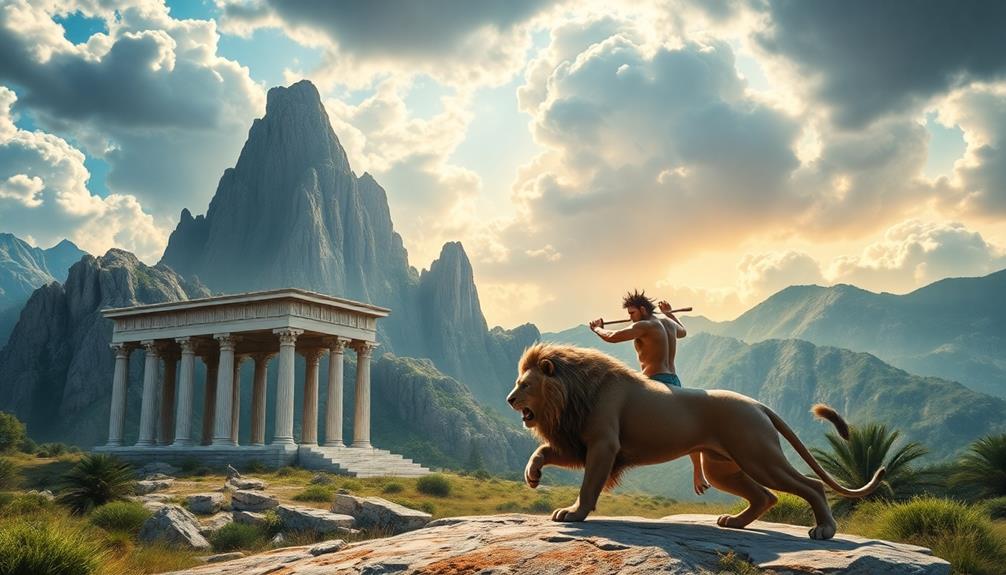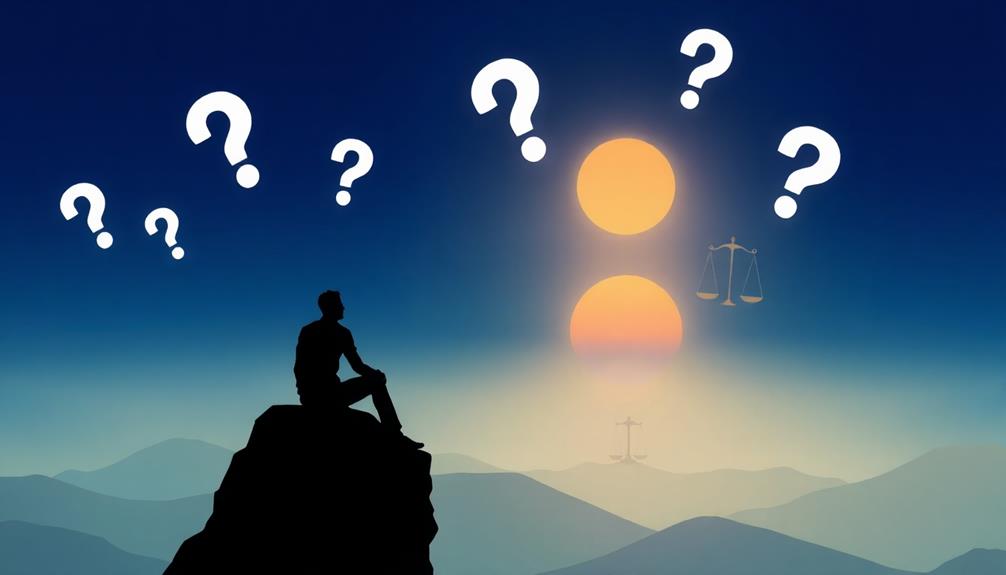When you explore whether Hercules actually existed, you find a blend of myth and possible historical inspiration. Born to Zeus and Alcmene, Hercules' stories emerged during the Greek Dark Ages, evolving through oral tradition. Theories range from him being purely mythical to having roots in real figures, like a Minoan warlord. His famed Twelve Labors showcase extraordinary strength and resilience, capturing the imagination of ancient Greeks. Temples dedicated to him across Greece reveal his cultural importance. Hercules remains a symbol of heroism, intriguing hearts and minds. Discovering more about his enduring legacy might surprise you further.
Key Takeaways
- Hercules is primarily viewed as a mythological figure, with no definitive historical evidence of his existence.
- His character likely draws inspiration from real individuals, such as Minoan princes or warlords.
- Temples and shrines dedicated to Hercules indicate his cultural significance and worship in ancient Greece.
- Myths surrounding Hercules evolved during the Greek Dark Ages, reflecting societal values and oral storytelling traditions.
- Hercules symbolizes strength and resilience, embodying the human struggle against adversity and the pursuit of redemption.
Origins of Hercules
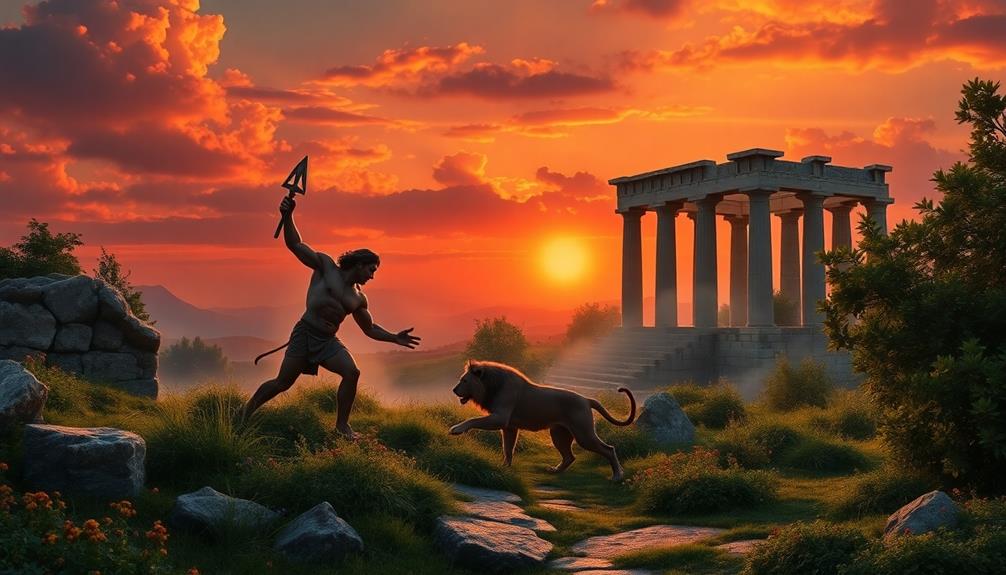
Hercules, or Heracles as he's also known, has a fascinating origin story that blends the divine and the mortal. Born to Zeus and Alcmene, he stands as a bridge between gods and humans in Greek mythology. His very name, Herakles, means "glorious gift of Hera," a title that ironically sparked the goddess Hera's unending wrath against him.
From the moment of his birth, Hera's jealousy fueled numerous attempts on his life, including her notorious plot involving two deadly snakes. Raised in Thebes, you'd see Hercules displaying extraordinary strength even as an infant, famously strangling the snakes sent by Hera in his crib.
This remarkable display of power marked the beginning of his legendary status, which only grew as he faced challenges throughout his life. The myths surrounding Hercules didn't just spring from the imagination of ancient Greeks; they also drew inspiration from Near Eastern motifs, particularly those showcasing heroic feats and lion-fighting themes.
This blend of cultural influences adds another layer to his already rich narrative, making Hercules a timeless figure in the tapestry of mythology.
The Mythical Twelve Labors
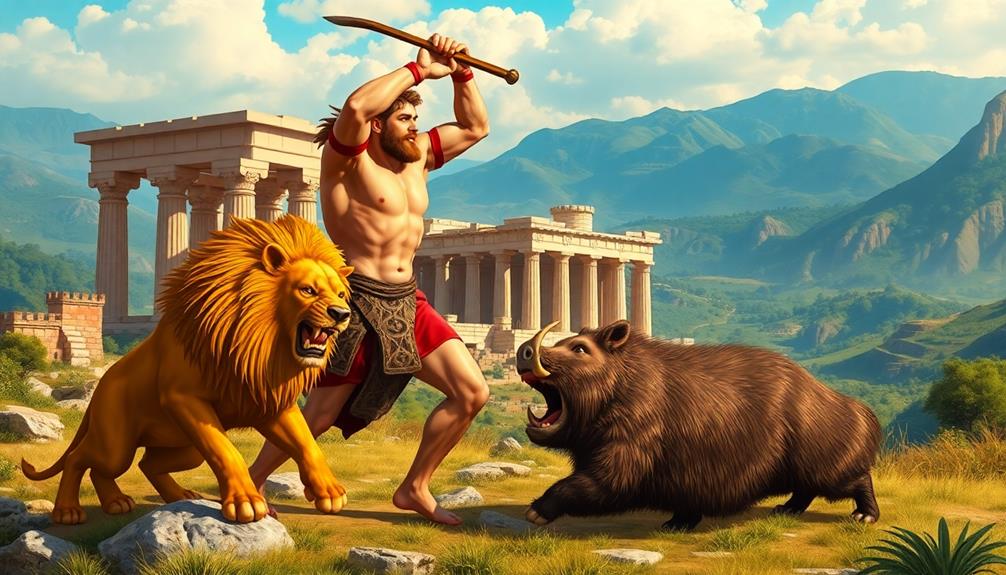
The Twelve Labors of Hercules stand as some of the most renowned feats in Greek mythology, showcasing not only his incredible strength but also his resilience and cleverness. Assigned by King Eurystheus, these tasks were a form of penance for Hercules after he tragically killed his family during a fit of madness caused by Hera. Each labor tested his abilities in unique ways.
Among these iconic challenges, you can find the formidable task to slay the nine-headed Lernaean Hydra. With the help of his nephew Iolaus, Hercules used fire to prevent the Hydra's heads from regenerating, demonstrating his quick thinking and teamwork.
Other labors included capturing the Golden Hind and defeating the fearsome Nemean Lion, all designed to push him to his limits.
Completing the Twelve Labors not only purified Hercules but also paved his path to immortality, ultimately leading to his acceptance among the gods on Mount Olympus.
Each labor holds deeper symbolic significance, representing bravery, resourcefulness, and the eternal struggle between man and nature, solidifying Hercules' status as a heroic figure in ancient mythology.
Historical Context and Background
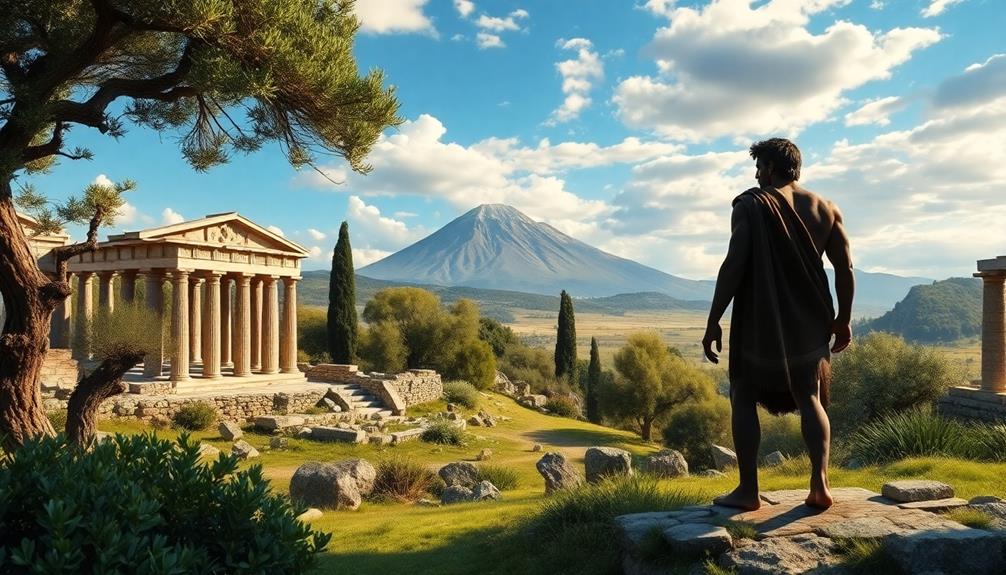
Understanding the Twelve Labors of Hercules requires a look at the historical context in which these myths developed. During the Greek Dark Ages, from the 12th to 8th centuries BCE, oral traditions thrived, allowing stories of heroes like Hercules to be passed down through generations. This period laid the groundwork for later literary works, particularly as the ancient Greek alphabet emerged around 800 BCE.
Historical theories suggest Hercules might've been inspired by a real individual, possibly a Minoan prince or warlord. Over time, these tales likely became embellished, transforming him into a legendary figure. The late Bronze Age is believed to be when Hercules lived, with many of his exploits reflecting actual historical events and societal values of ancient Greece.
Moreover, Hercules was seen not just as a myth but as a cultural forefather. Aristocratic families often claimed descent from him to bolster their legitimacy and status. This connection to a heroic king reinforced the importance of Hercules in Greek identity and culture, making him a symbol of strength, resilience, and lineage that resonated deeply with the people of his time.
Theories of Existence
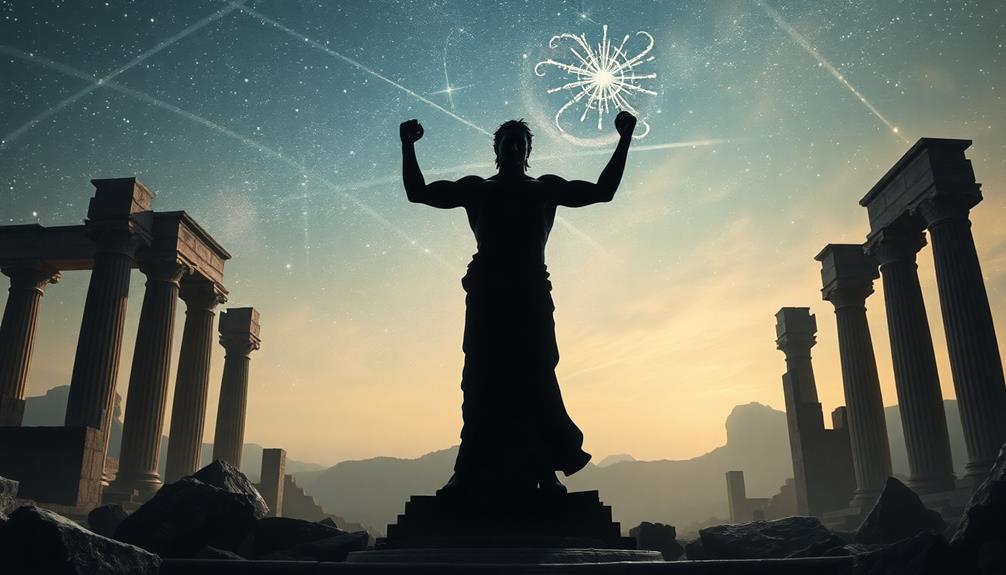
Throughout history, theories about Hercules' existence have sparked fascination and debate. Many believe he was a purely mythological figure born from the tales of gods on Mount Olympus, while others speculate he may have originated from a historical leader. As stories were told and retold, they evolved, transforming him from a real person into an iconic cultural hero.
Here's a breakdown of some prominent theories:
| Theory Type | Description | Evidence/Support |
|---|---|---|
| Mythological Figure | Hercules as a creation of myth and legend | Lack of historical evidence |
| Historical Basis | Inspired by a Minoan prince or warlord | Similarities in exploits |
| Cultural Hero | Revered figure with temples and shrines dedicated | Influence on ancient Greek identity |
While there's no solid evidence of Hercules as a historical individual, many Greeks revered him as a forefather. Aristocratic families even claimed descent from him to bolster their status, showcasing the blend of myth and potential historical narratives that shaped these theories about Hercules' existence.
Cult and Worship Practices
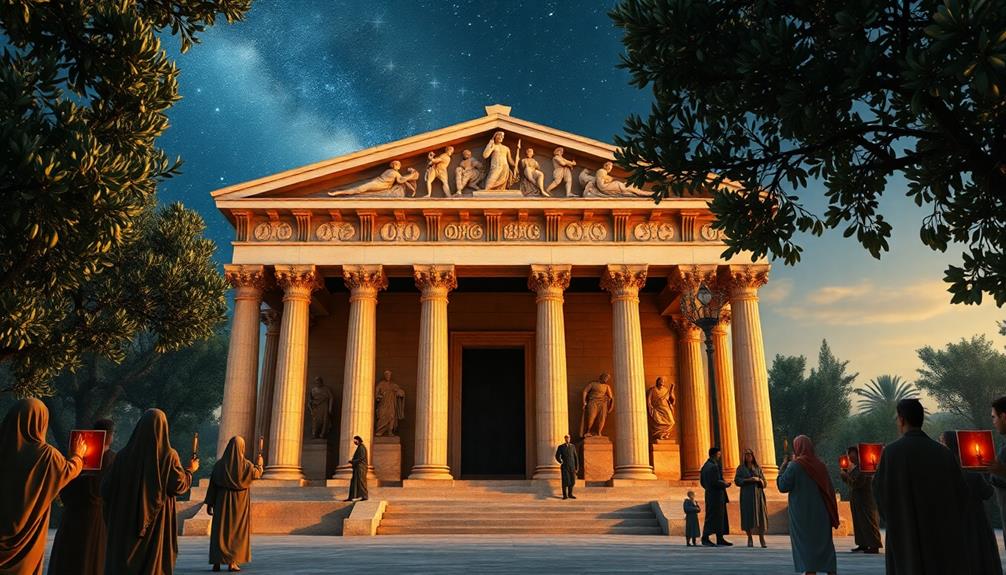
Many ancient Greeks celebrated Hercules through elaborate cult and worship practices that highlighted his significance in their society. Temples dedicated to Hercules, also known as Heracles, were constructed across Greece, symbolizing his revered status as both a hero and a god.
You'll find these temples in various city-states, each reflecting local devotion to this legendary figure. One of the most important events honoring Hercules was the Festival of Heracleia, celebrated in late July or early August. This festival commemorated his death and ascent to Olympus, allowing communities to come together in reverence and celebration.
In addition to the festivals, separate sanctuaries recognized Hercules as a patron deity, emphasizing the localized nature of his worship. Cities like Heraclea in Italy and Heraklion in Crete were named in his honor, showcasing how widespread his worship was throughout the ancient world.
The enduring rituals and festivals associated with Hercules persisted because of his legendary status and the powerful themes of suffering and redemption that resonated with the people. In these ways, Hercules became an essential part of the spiritual and cultural fabric of ancient Greek life.
Character Traits and Symbolism
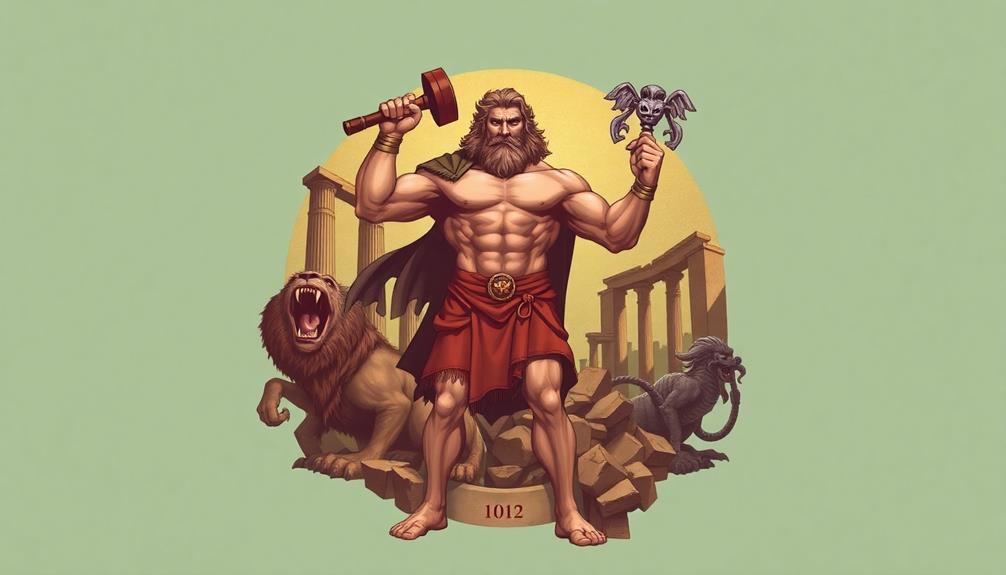
Hercules' worship in ancient Greece not only highlights his revered status but also sheds light on his character traits and the symbolism he embodies. He represents the ideal balance of strength and courage, often depicted wearing the skin of the Nemean Lion, a symbol of triumph over challenges. This imagery not only showcases his physical prowess but also his ability to confront adversity head-on.
His character is marked by ingenuity and complexity. You can see this in how he tackled the Lernaean Hydra using strategy and teamwork, proving that true heroism involves more than just brute force.
Key aspects of Hercules' character include:
- Strength and Resilience: His heroic feats demonstrate the power of perseverance.
- Courage in the Face of Chaos: He embodies the struggle between civilization and barbarism, acting as a protector of mankind.
- Redemption: His duality as a flawed demigod reflects the human quest for redemption, making him relatable and inspiring.
Ultimately, Hercules symbolizes the eternal human pursuit of strength, courage, and the heroic journey through trials and tribulations.
Cultural Impact and Legacy
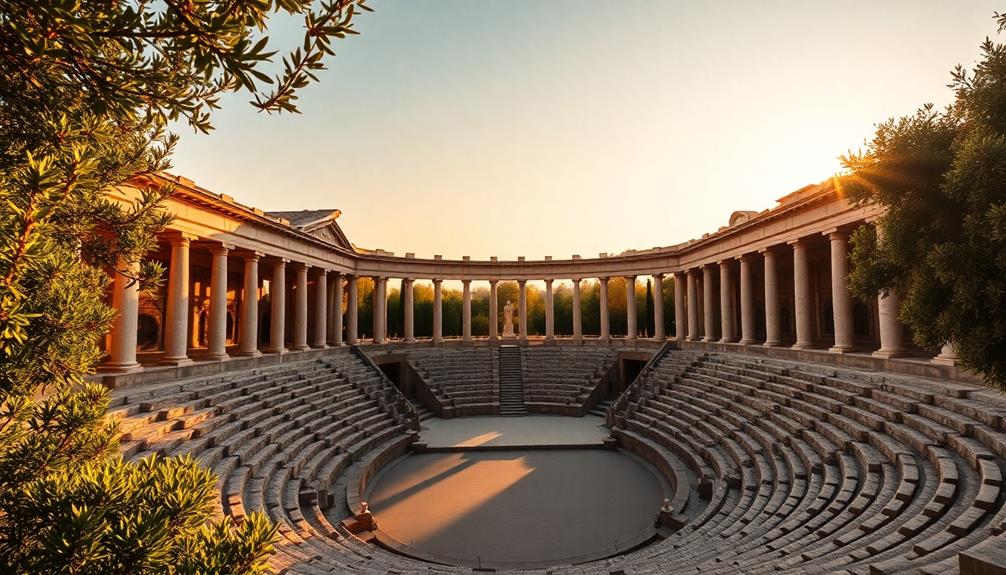
While his adventures may be rooted in ancient mythology, the cultural impact and legacy of Hercules extend far beyond his time. You'll find numerous temples and shrines dedicated to Hercules scattered across Greece, highlighting his significance in ancient worship.
Cities such as Heraclea were named in his honor, marking his lasting influence on urban development and cultural identity in the Hellenic world.
Aristocratic families often claimed descent from Hercules to establish legitimacy and enhance their status within society, further intertwining his myth with the fabric of daily life. His stories and feats shaped the cultural identity of ancient Greece, deeply influencing art, theater, and literature throughout history.
As you explore the question of did Hercules actually exist, it's clear that his legacy resonates through time, blending myth and cultural heritage. The tales of his strength and heroism have inspired countless generations, reminding us of the power of storytelling in shaping societal values.
Hercules remains a symbol of perseverance and bravery, and his influence can still be felt in various aspects of culture today.
Hercules in Modern Interpretation

Hercules, or Heracles as he's known in Greek mythology, has found his way into countless modern interpretations that resonate with today's audiences. These portrayals often emphasize his legendary strength and heroic feats while introducing themes that reflect your own struggles and triumphs.
- Self-discovery: In many adaptations, Hercules became a figure whose journey represents personal growth and understanding, illustrating the importance of knowing oneself.
- Redemption: Modern stories often explore his fit of madness, showcasing how he overcomes adversity and seeks redemption for his past mistakes.
- Complexity: Unlike earlier myths that simplify his deeds, contemporary narratives present Hercules as a multi-dimensional character facing moral dilemmas, enhancing his relatability.
From Disney's animated film "Hercules," where the darker aspects are downplayed, to video games like "God of War," where he navigates complex character arcs, the hero's enduring legacy continues to captivate you.
With each interpretation, Hercules stands as a symbol of strength and resilience, reminding you of the timeless human struggle against adversity and the quest for identity in an ever-changing world.
Frequently Asked Questions
Did Heracles Actually Exist?
You'll find that Heracles' existence remains debated. Scholars suggest he's either a myth, a historical figure, or a blend of real individuals. His legendary status, however, undeniably shaped ancient Greek culture and identity throughout history.
Is Hercules Mythologically Accurate?
You'll find Hercules embodies mythological accuracy in his heroism and challenges, reflecting ancient Greek values. His adventures symbolize human struggle against adversity, though his divine lineage and feats remain firmly rooted in mythology rather than historical fact.
Does Hercules Exist in Roman Mythology?
Oh sure, Hercules exists in Roman mythology—just like unicorns in your backyard! Romans celebrated him as a demigod, weaving his tales of strength and bravery into their culture, making him a legendary figure worth knowing.
Was Hercules Actually a God?
You might think Hercules was a god because of his divine parentage and immortal status after death. Yet, his human flaws and experiences make him more relatable, blending heroic traits with a complex, mortal-like character.
Conclusion
While some might argue that Hercules is purely a myth, remember that myths often stem from real historical figures or events. The tales of Hercules reflect ancient Greek values and struggles, resonating through time. Even if he didn't exist in the way we think, his story embodies the human experience—strength, perseverance, and heroism. So, whether real or imagined, Hercules continues to inspire and connect us, proving that legends can shape our understanding of ourselves and our culture.
